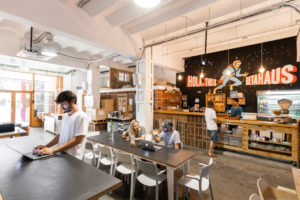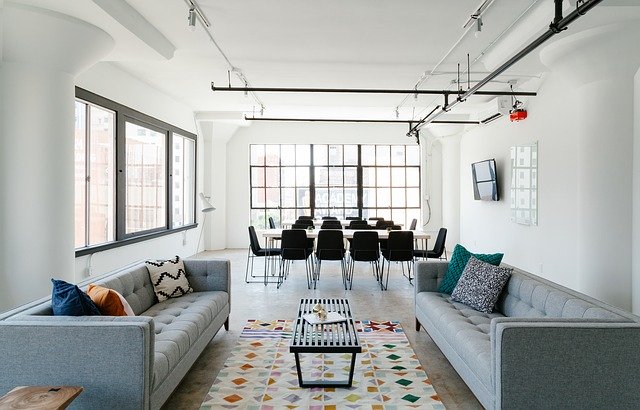Hi Jakob. Can you tell us a bit about your experience and introduce us to MatchOffice?

Jakob Dalhoff, CEO of MatchOffice
I started working in commercial real estate 2001. In 2003 I began to look into opportunities of how real estate can go online. Because of this knowledge I was helping and advising MatchOffice from the beginning of 2004, how to generate leads and customers online. Since 2009 I developed a passion for this industry and in 2014 I became CEO at MatchOffice. In 2016 we have merged MatchOffice together with Lokalebasen.dk and moved most of the company to Ukraine. Our business model is quite simple, it is “No Cure – No Pay”. We generate as many leads as possible and hopefully a lot of them will become good tenants for our customers, business centers and coworkings. Today we represent more than 9000 locations in more than hundred countries, generating more than 1000 deals each year. We employ more than 40 people.
What have you observed in the evolution of the flexible workplace market?

Betahaus Barcelona
Since the beginning of MatchOffice in 2004, the flexible workspace has really evolved. In many counties the market consisted of only traditional business centers like Regus. Most concepts were the same. It was what we called “3 and 4-star Business Centers”. The average growth in markets was 10%. During this growth in numbers there was also growth in varieties. Before the financial crises a lot of high rate business centers with high quality and expensive design appeared in the market. First coworking spaces had a different business model compared to traditional business centers and it was difficult for MatchOffice to find a way to work with them. As coworkings began to operate more like traditional business centers we started our cooperation. When we started, not many people were aware of business centers and even less knew what coworking was. Today, 90% of decision makers of companies have some knowledge about the coworking industry. For me it has been quite exciting to see the changes in companies that now consider moving into coworking spaces. In the beginning, lawyers and banks stated that they would never move to a coworking location. But in recent years I have seen both. Nowadays, even embassies and official government organisations consider coworkings. Big companies need inspiring surroundings to recruit talent. Coworking nowadays offers some of the best working environment and design it has ever offered.
Nowadays, even embassies and official government organisations consider coworkings. Big companies need inspiring surroundings to recruit talent.
Would you say that the online “meeting room booking” and the online “workplace booking” solutions are merging, nowadays?
 I had really thought that these two markets would merge, but it is not what I’m seeing now. I think one of the reasons is the different behaviour of the users. Users are willing to book a meeting room online and pay just like when they book a hotel. When people want to book an office, they want to see 3-5 location physically before they decide. MatchOffice is focusing and making a lot of effort regarding meeting rooms, but it still a very small part of our business. For the next couple of years, we are giving exposure to meeting rooms for free. It is our strategy to collect the biggest number of meeting rooms worldwide.
I had really thought that these two markets would merge, but it is not what I’m seeing now. I think one of the reasons is the different behaviour of the users. Users are willing to book a meeting room online and pay just like when they book a hotel. When people want to book an office, they want to see 3-5 location physically before they decide. MatchOffice is focusing and making a lot of effort regarding meeting rooms, but it still a very small part of our business. For the next couple of years, we are giving exposure to meeting rooms for free. It is our strategy to collect the biggest number of meeting rooms worldwide.
Users are willing to book a meeting room online and pay just like when they book a hotel. When people want to book an office, they want to see 3-5 location physically before they decide.
Shall we expect the rise of Booking.com or Expedia kind of dominating platforms for coworking?
Looking for a coworking location is so much different than looking for a hotel.  That’s why Booking.com will not become dominant in this market. Most research regarding a hotel is done in less than an hour, a search for a coworking takes 2-4 weeks. Many of our clients get 40% of their leads through their current tenants on their locations, so a word of mouth is a big part of the coworking industry. 10-15% of leads are generated through physical advertisement on the building. And a lot of leads are coming thanks to being recognised by a local business community, through events, etc. These three channels are not available for hotels and therefore no platform can have the same dominant position.
That’s why Booking.com will not become dominant in this market. Most research regarding a hotel is done in less than an hour, a search for a coworking takes 2-4 weeks. Many of our clients get 40% of their leads through their current tenants on their locations, so a word of mouth is a big part of the coworking industry. 10-15% of leads are generated through physical advertisement on the building. And a lot of leads are coming thanks to being recognised by a local business community, through events, etc. These three channels are not available for hotels and therefore no platform can have the same dominant position.
Many of our clients get 40% of their leads through their current tenants on their locations, so a word of mouth is a big part of the coworking industry.
Shall coworking operators expect their sales process to move more and more on platforms?
My advice to coworkings is to use as many sales channels as possible. As long as a coworking location has available space it is, in a way, losing money every day that it isn’t “sold”. I don’t think any coworking operator should rely on only one sales channel. This would make it riskier and more vulnerable. I would even recommend coworkings to use different platforms.
My advice to coworkings is to use as many sales channels as possible.
How about you external growth strategy in Europe?
 MatchOffice strategy has always been focused on organic growth. Since we are keeping the customers happy, we can grow with 1000-2000 locations each year, as we only lose less than 20 locations. Over the last 18 months we have hired more than 15 full-time marketing experts. During the first part of 2020 we are consolidating our European market and in the second half we will begin focusing on Asia.
MatchOffice strategy has always been focused on organic growth. Since we are keeping the customers happy, we can grow with 1000-2000 locations each year, as we only lose less than 20 locations. Over the last 18 months we have hired more than 15 full-time marketing experts. During the first part of 2020 we are consolidating our European market and in the second half we will begin focusing on Asia.
During the first part of 2020 we are consolidating our European market and in the second half we will begin focusing on Asia.
The competition between online platforms seems fiercer and fiercer. Will there be available Google Adwords for everybody?
There are two kinds of platform operators. The global approach with one .com domain and then the local platforms only having customers in one or two countries. At MatchOffice we are doing both, we have global strategy and .com domain with all location generating cross border transactions, and then we have 21 local domains to meet the local demand, like matchoffice.de, matchoffice.es, matchoffice.be etc. AdWords are for everyone with deep pockets.
AdWords are for everyone with deep pockets.
Do you see the customer expectations being very different from a European country to another?
 All customer expectations are rather similar, but there is a big difference when we are talking about customers from big and small cities. In a big city you have large financial companies that you don’t see outside the capitals, the financial and banking services are pretty developed there. Paris and London have more in common than London and York. All customer expectations are rather similar, but there is a big difference when we are talking about customers from big and small cities.
All customer expectations are rather similar, but there is a big difference when we are talking about customers from big and small cities. In a big city you have large financial companies that you don’t see outside the capitals, the financial and banking services are pretty developed there. Paris and London have more in common than London and York. All customer expectations are rather similar, but there is a big difference when we are talking about customers from big and small cities.
Is the offering big and diverse enough, nowadays, on continental Europe?
I would say so, diversity hasn’t been bigger than it is now, but history has also told me that diversity will grow due to competition and market growth. In the coming years we will see more offers and concepts that we haven’t even thought about.
There are no star system, for instance, in the workplace as a service industry… how do you deal with the different standard and styles?
A couple of years ago the Spanish Business Center organisation introduced a star rating. Unfortunately, I don’t know the result they were able to yield, but this could be interesting to investigate. We have asked our partners to rate themselves, to signal to potential customers what to expect.
How do you see the evolution of the “workplace consumption” in the coming five years on continental Europe?
I’m 100% sure that we will see the growth in a demand of flexible workplace, new concepts and design and this will attract new segments of customers. The old Eastern Europe that started later will have the biggest growth as it’s coming from a low level. The operators will be more international; in Asia most big operators work in 5-6 different counties. This we will also begin to see in Europe. For example, one of our most professional clients from Istanbul is opening his first location in Germany in spring. A customer from London is launching new locations in three German cities during 2020. Coworking has a great future in both short and long term perspectives.
I’m 100% sure that we will see the growth in a demand of flexible workplace, new concepts and design and this will attract new segments of customers.
Join Coworking Europe Conference for more insights, data and connections!




0 Comments